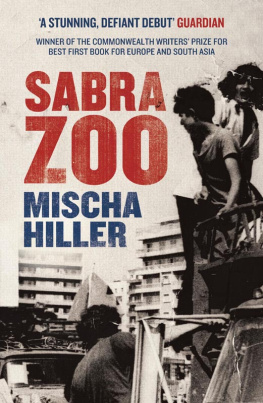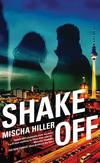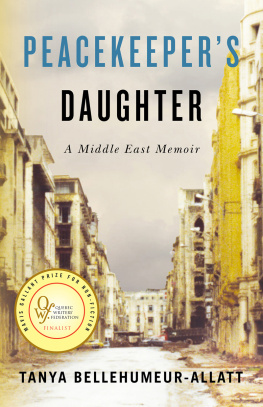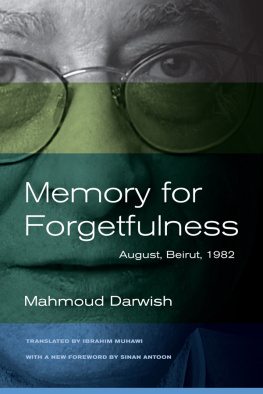Mischa Hiller - Sabra Zoo
Here you can read online Mischa Hiller - Sabra Zoo full text of the book (entire story) in english for free. Download pdf and epub, get meaning, cover and reviews about this ebook. year: 2010, publisher: Telegram Books, genre: Detective and thriller. Description of the work, (preface) as well as reviews are available. Best literature library LitArk.com created for fans of good reading and offers a wide selection of genres:
Romance novel
Science fiction
Adventure
Detective
Science
History
Home and family
Prose
Art
Politics
Computer
Non-fiction
Religion
Business
Children
Humor
Choose a favorite category and find really read worthwhile books. Enjoy immersion in the world of imagination, feel the emotions of the characters or learn something new for yourself, make an fascinating discovery.
- Book:Sabra Zoo
- Author:
- Publisher:Telegram Books
- Genre:
- Year:2010
- Rating:4 / 5
- Favourites:Add to favourites
- Your mark:
- 80
- 1
- 2
- 3
- 4
- 5
Sabra Zoo: summary, description and annotation
We offer to read an annotation, description, summary or preface (depends on what the author of the book "Sabra Zoo" wrote himself). If you haven't found the necessary information about the book — write in the comments, we will try to find it.
Sabra Zoo — read online for free the complete book (whole text) full work
Below is the text of the book, divided by pages. System saving the place of the last page read, allows you to conveniently read the book "Sabra Zoo" online for free, without having to search again every time where you left off. Put a bookmark, and you can go to the page where you finished reading at any time.
Font size:
Interval:
Bookmark:
This eBook edition published 2011
First print edition published 2010 by Telegram
eISBN: 978-1-84659-102-0
Copyright Mischa Hiller, 2010 and 2011
TELEGRAM BOOKS
26 Westbourne Grove
London W2 5RH
www.telegrambooks.com
All rights reserved. No part of this book may be reproduced or transmitted in any form or by any means, electronic or mechanical, including photocopying, recording or by any information storage and retrieval system, without permission in writing from the publisher.
I sat in the front passenger seat of the yellow 1966 Mercedes, clinging to the leather strap. Samir was driving too fast through the potholed streets of Sabra refugee camp, like he was still driving PLO bigwigs around. I clung to the strap with both hands, slithering across the worn leather seat as we went round a corner, my stomach punishing me for the amount Id drunk the night before. I looked out of the window to fight the nausea, trying to concentrate on the passing scenery. I was never sure when the transition from city to camp happened, whether there was some recognised boundary. I suppose the buildings became smaller, less well built, their breeze-block walls unplastered. There was no tarmac on the road and there was a lot more corrugated iron. This wasnt a refugee camp in the sense of tents and blankets issued to displaced people, it was more a sprawling shanty town built up over the years on the outskirts of the city. Many of the people in the camp were born there, attended a UN-run school there, worked and got married there. Off the main road the buildings became single storey and the streets grew narrower until they were just a network of alleys with small one- and two-room houses. Children jumped out of the path of the Mercedes as it came to a sliding stop in front of the Red Crescent Hospital, easily the tallest building around. I waited for the dust and my stomach to settle as Samir checked himself in the rear-view mirror, smoothing his moustache with his fingers then running them through his thick hair. He was clean shaven and well turned out. He gave me an appraising look.
Ivan, my friend, youll never lose your virginity looking like a gypsy, he said.
I shrugged inside my denim jacket and pulled at a frayed rip on my jeans. I knew it was a mistake to confide in you, I said.
He smiled. Alcohol loosens the tongues of men and, thank God, the morals of women. He lit a Marlboro as I stepped out of the car. Ill see you later, yes? he asked, revving the engine unnecessarily.
Ill stop by the caf, I said.
No sooner had I closed the door than Samir let out the clutch and fishtailed down the dirt road. I smiled to see him being cursed by the head-scarfed women left in his dusty wake. They glared at me, complicit through association, and I quickly entered the hospital building. Crossing the lobby, I passed a refugee family that looked like they were camped there, complete with foam mattresses and a small paraffin stove. Refugees within a refugee camp. I ran up the stairs to the orthopaedic ward but I had to pause for breath on the second floor, my lungs sore, thinking I ought to be in better shape at eighteen, that I should cut out the cigarettes. It was 8.30 in the morning and I was just in time to see the child-sized figure of Dr Asha Patel enter the ward. I followed her in, still panting from my climb.
Ah, Ivan, she smiled, just in time for rounds.
Eli, the Norwegian physiotherapist who was accompanying Asha, winked at me: shed been there the previous night, although she herself had been restrained in her drinking. I winked back. Perhaps I hadnt made such a fool of myself after all. She looked fresh and professional in her white scrubs and braided hair. I was conscious of my own war-torn jeans and grubby trainers. At least Id managed to find a clean T-shirt that morning. Eli wasnt pretty, not in the way that Samir would think, but there was something about her, the way she held herself, the frankness of her gaze. Several times Id caught sight of her across a room, laughing or smiling, and I knew she was beautiful. In the few days Id known her, Id never seen her wear make-up, although she was partial to wearing ribbons in her hair.
Are you two ready? Asha asked, raising her black eyebrows at me in mock seriousness. She smiled again and my eyes were drawn to her perfectly formed white teeth; it happened every time she smiled, which she did a lot.
We stopped by the bed of an unconscious man who had a bloody bandage covering the stump where his right leg used to be. His family were standing around him, towering over Asha expectantly.
Asha prodded at his bandage. Tell them I had to remove his leg
I waited, hoping to be able to interpret something more than the obvious.
Tell them his leg was too damaged by the shrapnel to be saved, but that with the right prosthetic and treatment from Eli hell be walking in several weeks.
She waited as I struggled for the Arabic for prosthetic. I settled for false leg instead, although God knows Id had to say it often enough that summer for it to be in my top ten most used words.
Asha continued, Because the amputation was beneath the knee he will have complete flexibility in the leg, so he was lucky in that respect.
She smiled at the family as I translated. I asked if they had questions. The mans wife started to cry and a male relative thanked Asha, calling her Doctora. She was renowned in the camp, her tireless efforts to patch people up rewarded with enormous respect by men who wouldnt have let their own sisters become doctors but would no doubt have begged to be operated on by this small Indian woman if theyd been unfortunate enough to need it.
This boy is a sad case, Asha said in her perfect, easy-on-the-ear English, stopping at the bed of a dark-haired kid of about twelve or thirteen, about the same age my brother Karam would have been if he was still alive. He had the same dark look about him, the same eyes, eyebrows that almost met in the middle and thick hair. He was having his dressing changed by a nurse and his black eyes flashed in anger or pain. His foot was badly damaged although Dr Angstrom and I managed to save it, said Asha. A woman, maybe the boys mother, sat by his bed, stroking his dark hair. I felt queasy as the nurse irrigated the wound with saline, running gauze through a hole in one side of his foot and out of the other. The boy moaned. Asha held his bony hand and asked the nurse how much pethidine he was on.
More than he should be, the nurse replied, another foreign volunteer, Scandinavian of some sort, I didnt know and it wasnt the time to inquire, although Samir would have had the name of her hotel by now, would have arranged to meet her later and take her on a tour of recent bomb sites. Asha was talking to me.
Tell his aunt that he will need three weeks in hospital and then physiotherapy, to make sure he walks properly again.
I translated, the Arabic for physiotherapy eluding me as the sight of the wound and last nights vodka conspired to make me inarticulate. Luckily, the boys aunt kicked in as I floundered, effusively thanking Doctora Asha.
She said thank you, was the best I could do; my stomach had become detached from the rest of my insides and my hands felt clammy.
Maybe Ivan needs to lie down, Eli said.
I ignored the jibe and was relieved to see the nurse start to dress the terrible wound. I tried to focus on the fact that the boy was now addressing me.
Have you ever seen a wound like this? he said, pointing at his foot. He tried to shift himself up the bed using arms that didnt look strong enough to support even his light weight.
Youre very brave, I said. How did it happen?
Font size:
Interval:
Bookmark:
Similar books «Sabra Zoo»
Look at similar books to Sabra Zoo. We have selected literature similar in name and meaning in the hope of providing readers with more options to find new, interesting, not yet read works.
Discussion, reviews of the book Sabra Zoo and just readers' own opinions. Leave your comments, write what you think about the work, its meaning or the main characters. Specify what exactly you liked and what you didn't like, and why you think so.










